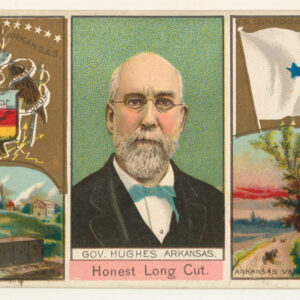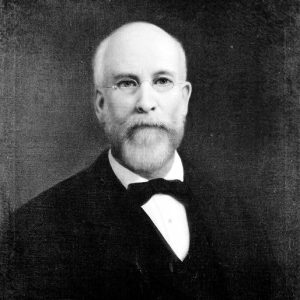calsfoundation@cals.org
Simon Pollard Hughes (1830–1906)
Fifteenth Governor (1885–1889)
Simon Pollard Hughes typifies the ex-Confederate, personally prosperous, conservative post-Reconstruction Democratic governors of Arkansas as well as several other Southern states. As attorney general and as a two-term governor, he stressed the need for the state to have a good credit rating. Though his political career began in the 1850s, his longest public service was as an associate justice of the Arkansas Supreme Court for sixteen years.
Simon P. Hughes was born on April 14, 1830, near Carthage, Smith County, Tennessee, the third son of Simon P. Hughes and Mary Hubbard. When Hughes’s mother died in 1842, the family moved to Bowie County, Texas, but his father died in 1844, leaving the fourteen-year-old Hughes an orphan. (There is no concrete evidence Hughes ever used “Pollard” and especially “Jr.” in signing his name.) In 1844, he accompanied some relatives to Pulaski County, Arkansas, where he worked on a farm for wages.
In 1846, he entered Sylvan Academy in Sumner County, Tennessee, and studied Latin and mathematics, but, by 1848, he was a student at Clinton College in his native county. Although he did well in his studies, his financial situation by late 1849 forced him to return to Arkansas, where he established a residence on the White River near Clarendon (Monroe County). He worked on various farms, befriending the local sheriff, who endorsed him for sheriff in 1853. While serving as sheriff from 1854 to 1856, Hughes also studied law and gained admission to the Monroe County bar. In 1857, he established a law practice in Clarendon with William W. Smith, who afterward became an associate justice of the Arkansas Supreme Court. The partnership endured until 1874 and was Hughes’s principal source of income during these years.
On June 2, 1857, shortly after the establishment of his law firm, Hughes married Ann E. Blakemore, a native of Clarendon. They had nine children, six of whom lived to maturity.
The sectional crisis that resulted in the Civil War profoundly affected Hughes and his family. In political philosophy, he professed to be a Whig. During the presidential campaign of 1860, however, he supported John Bell of Tennessee, the nominee of the Constitutional Unionists, and then made several speeches against secession following the election of Abraham Lincoln. However, when war began, he enlisted in the Confederate army and became the captain of Company F in the Twenty-third Arkansas Infantry Regiment. (Hughes’s family moved to Cherokee County, Texas, to avoid Civil War strife in Arkansas.) He was promoted to lieutenant colonel of the regiment. When the regiment was reorganized following the Battle of Shiloh, he joined Morgan’s Texas Battalion of Cavalry as a private and served until the war ended.
During the war, he became a proponent of the Democratic Party, and he was elected to the Arkansas House of Representatives in 1866 by the citizens of Monroe County. He was chosen as one of four commissioners sent to President Andrew Johnson to stave off a harsh Reconstruction program for Arkansas; the mission failed. Hughes, a prewar officeholder who had joined the Confederate army, was disenfranchised from 1867 until 1874.
He returned to politics and served at the state’s constitutional convention in 1874 as the delegate from Monroe County. His work at the convention brought him a statewide political base. On September 9, 1874, at the Democratic convention that nominated Augustus Hill Garland for governor, Hughes was chosen as the party’s candidate for attorney general. The election for both state officials and for ratification of the proposed constitution was held on October 13, 1874. Garland, Hughes, and the constitution all received overwhelming mandates.
Hughes was sworn in as attorney general on November 12, 1874, and served until the end of 1876. He sent a written opinion to the General Assembly that lands granted by Congress to aid in the construction of railroads in Arkansas were subject to taxation, an opinion challenged before the Arkansas Supreme Court and the U.S. Supreme Court after the legislature levied such taxes. Hughes appeared as counsel for the state before the Arkansas Supreme Court in the case of the St. Louis, Iron Mountain and Southern Railroad in 1875. Following the positive court decision, the railroads paid taxes on those lands.
Along with eleven others, Hughes sought the gubernatorial nomination in June 1876 at the Democratic state convention. However, state auditor William Read Miller emerged as the leading candidate. Hughes spent the next eight years practicing law in Little Rock (Pulaski County) and pursuing his agricultural interests. During this period, he acquired several farms in various counties and enjoyed obvious financial success.
In 1884, Hughes emerged once more as a candidate for the Democratic gubernatorial nomination when the incumbent, James Henderson Berry, announced that he would not seek reelection. The campaign for the party nomination was complicated by the rise of the Agricultural Wheel, a farmers’ organization committed to numerous agrarian relief measures. Hughes’s leading opponent was a Little Rock merchant, Colonel John G. Fletcher, who had considerable support among farmers. Both candidates canvassed the state thoroughly and were about equal in strength when the convention convened on June 25, but Hughes finally emerged triumphant. He then stumped around the state in the campaign against Thomas Boles, his Republican opponent, and on September 1, 1884, won a landslide victory of 100,875 votes to 55,388.
Hughes was inaugurated as governor on January 17, 1885. His most significant concern, was that the legislature provide a sound basis for repayment of the undisputed or “just” portion of the state debt. This matter related to the recent passage of the so-called Fishback Amendment, which had provided for repudiation of most of the Reconstruction-era debts.
Several significant measures were enacted and implemented during Hughes’s first administration, even though the state government was committed to economy and retrenchment and had ceased to borrow money. Several buildings had been erected at the state’s penal and charitable institutions, the capitol had been repaired, state support for public schools had been increased, and the treasury enjoyed a surplus. Part of the reason for these achievements was the handling of the state debt. The undisputed portion of the debt was made the responsibility of the state debt board (composed of the governor, auditor, treasurer, and attorney general) created on April 2, 1885. The board successfully reduced the state’s outstanding indebtedness without impairing its current obligations.
Hughes’s success in office ensured his party’s support for his re-nomination, especially after some disgruntled farmers decided to back the Agricultural Wheel in its attempt to create a new political party. The Wheel selected Charles E. Cunningham, a former Greenback Party member, after Colonel Fletcher declined to head the new group’s ticket, while the Republicans chose Lafayette Gregg, who had been an associate justice of the state Supreme Court during Reconstruction. On September 6, Hughes garnered 90,650 votes to Gregg’s 54,063 and Cunningham’s 19,169.
Hughes took the oath of office for his second term on January 15, 1887. In his address to the General Assembly, Hughes restated his desire to see that the railroads bore their fair share of taxes. In one specific instance, the St. Louis, Iron Mountain and Southern Railway Company paid the sum of $250,000 in settlement of all claims for back taxes due, a dispute that went back to the 1875 case.
Even though Hughes had noted in his first inaugural address, “We are almost wholly an agricultural people,” state officials had done little to provide agrarian relief by the end of his term, and Hughes’s having been an officer in the state Patrons of Husbandry (the Grange) in the 1870s no longer had much appeal to many poorer farmers. Moreover, his proclamation in 1886 for the Iron Mountain railroad to immediately resume service was still viewed by some working men as the reason the Great Southwestern Strike had collapsed.
Nonetheless, when he decided to seek a third term in 1888, he cited the state’s large growth in population (the total reached almost 1 million) and wealth (taxable values had risen on $140 million); an improved physical plant at most state institutions; the stable condition of state finances; and increases in the total of cultivated land, in the means of transportation, and in public school facilities. However, when the state Democratic convention assembled on May 31 in Little Rock, Hughes faced three other major candidates. Col. Fletcher was backed by many businessmen and, paradoxically, by some sympathizers of the Agricultural Wheel. James Philip Eagle, a planter from Lonoke County and speaker of the house during Hughes’s first term, also appealed to farmers and others by stressing economy and retrenchment. William Meade Fishback of Fort Smith (Sebastian County) aroused support by stressing his long advocacy of repudiating “unjust” debt. For three days, the Democrats remained deadlocked in the struggle. Fishback withdrew on the 117th ballot, and Fletcher’s supporters began to desert, joining Eagle, with the final result being 248 votes for Eagle and 205 for Hughes. The convention then unanimously chose Hughes to be the Democratic national committeeman from Arkansas.
During the subsequent campaign, Hughes traveled the state in behalf of his party. When he left office on January 17, 1889, his popularity was considerable. That same year, Hughes was chosen an associate justice of the state Supreme Court. He was elected to his initial eight-year term on April 2, 1889, and was reelected in 1896. His service on the bench was noncontroversial and enhanced his reputation for fairness.
Following his retirement on November 1, 1904, Hughes suffered increasingly poor health and was confined for the last several months of his life to his home in Little Rock. He died on June 29, 1906, and is buried in Mount Holly Cemetery.
For additional information:
DeBoer, Marvin, ed. Dreams of Power and the Power of Dreams: The Inaugural Addresses of the Governors of Arkansas. Fayetteville: University of Arkansas Press, 1988.
Donovan, Timothy P., Willard B. Gatewood Jr., and Jeannie M. Whayne, eds. The Governors of Arkansas: Essays in Political Biography. 2nd. ed. Fayetteville: University of Arkansas Press, 1995.
Herndon, Dallas. Centennial History of Arkansas. Little Rock: Clarke Publishing Co., 1922.
Moore, Waddy, ed. Arkansas in the Gilded Age, 1874–1900. Little Rock: Rose Publishing Co., 1976.
Moneyhon, Carl. Arkansas in the New South, 1874–1929. Fayetteville: University of Arkansas Press, 1997.
Simon P. Hughes Papers. Arkansas State Archives, Little Rock, Arkansas.
Harry W. Readnour
University of Central Arkansas
This entry, originally published in The Governors of Arkansas, appears in the CALS Encyclopedia of Arkansas in an altered form. The Governors of Arkansas is available from the University of Arkansas Press.
 Hughes Trading Card
Hughes Trading Card  Simon Hughes
Simon Hughes 




Comments
No comments on this entry yet.